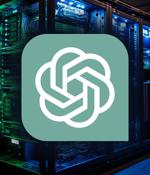Security News

Aided by the emergence of generative artificial intelligence models, synthetic identity fraud has skyrocketed, and now accounts for a staggering 85% of all identity fraud cases. Anomaly detection algorithms analyze transaction data to flag irregularities indicative of synthetic identity fraud, continuously learning from new data and evolving fraud tactics to enhance effectiveness over time.

The complaint follows a similar protest in the European Union under the General Data Protection Regulation, which resulted in the social media biz agreeing to pause plans to train AI models on EU users' Facebook and Instagram users' posts. Although UK data protection law currently mirrors that in the EU, its decision to leave the economic and political bloc came into effect at the end of 2020.

This rings true; I've spoken with nearly 100 enterprise CISOs in the first half of 2024, and their primary concerns are how to get visibility over employee AI use, how to enforce corporate policies on acceptable AI use, and how to prevent loss of customer data, intellectual property, and other confidential information. How is AI acceptable use policy expressed? Consider an AI data access policy: a law or consulting firm might require that LLM data from client A can't be used to generate answers for client B. A public company's general counsel might want an AI topic access policy: employees outside of finance and below the VP level can't ask about earnings info.

Two House committee chairs have sent a public letter to the White House asking it to look into a deal between AI R&D outfit G42 and Microsoft. The missive [PDF] to National Security Adviser Jake Sullivan is authored by Reps Michael McCaul and John Moolenaar, respectively the chairs of the House Foreign Affairs Committee and the House Committee on Strategic Competition with the Chinese Communist Party.

The U.S. Department of Justice said it seized two internet domains and searched nearly 1,000 social media accounts that Russian threat actors allegedly used to covertly spread pro-Kremlin disinformation in the country and abroad on a large scale. "The social media bot farm used elements of AI to create fictitious social media profiles - often purporting to belong to individuals in the United States - which the operators then used to promote messages in support of Russian government objectives," the DoJ said.

In the field of threat intelligence there are specific ways in which AI tools are showing huge promise for cybersecurity teams, including in lifting the lid on dark web threats. There is a role for AI in gathering data from the dark web, applying structure to it, and ultimately turning it into intelligence that organizations can use to inform their security strategy.

After first announcing onboard AI in January, Samsung expanded what it's calling the Galaxy AI ecosystem on July 10 at the Galaxy Unpacked event in Paris. Samsung's two newest phones are the Galaxy Z Fold6 and Galaxy Z Flip6, both of which use Google's Gemini AI for translation, creative features and cosmetic changes.

The US Justice Department has seized two US-based domains used by Russian threat actors to create fake profiles on X that would spread disinformation in the United States and abroad. This bot farm was created and operated via Meliorator, an AI-enhanced software package. "Development of the social media bot farm was organized by an individual identified in Russia. In early 2022, Individual A worked as the deputy editor-in-chief at RT, a state-run Russian news organization based in Moscow," the DoJ claims.

The FBI and cybersecurity agencies in Canada and the Netherlands say they have taken down an almost 1,000-strong Twitter bot farm set up by Russian state-run RT News that used generative AI to spread disinformation to Americans and others. The international crime busters seized two web domains and 968 X accounts that were integral parts of the bot farm, the US Department of Justice said in a statement Tuesday.

Almost a thousand Twitter accounts controlled by a large bot farm pushing Russian propaganda and domains used to register the bots were taken down in a joint international law enforcement...